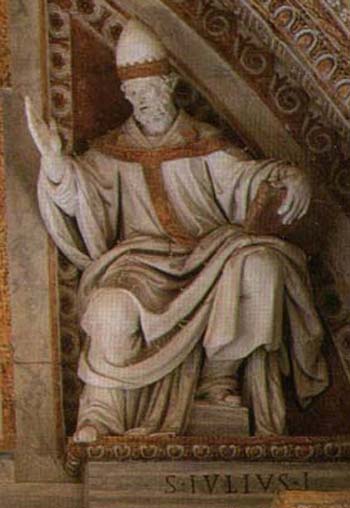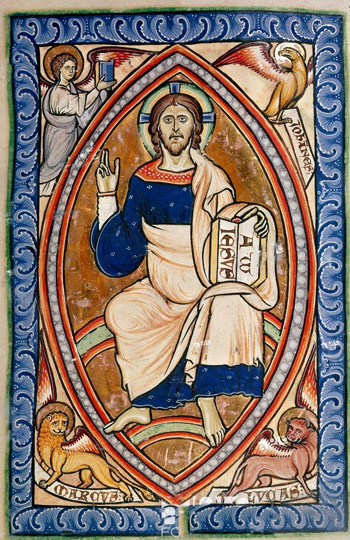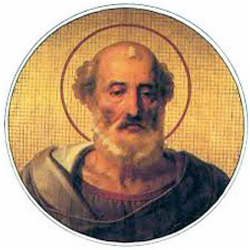The Saint of the Day
 |
 |
 |
 |
 |
 |
 |
Pope St. Julius I – April 12
Biographical selection:
The Martrylogy says that Pope St. Julius I (337-352) fought for the Catholic Faith against the Arians. He acquired the fame of sanctity and rested in peace after many glorious interventions in the Arian controversies.
In his Lives of the Saints, Engelbert of Cologne reports that Julius I fought against the Eusebians, who continued the Arian heresy and had a violent hatred for St. Athanasius, Bishop of Alexandria. When St. Athanasius tried to re-take his See of Alexandria, the heretics opposed him and appealed to the Pope, who convened the Council of Sardica in Illyria (343). Pope Julius received Athanasius in Rome to affirm his support of his doctrine and position.
 The Council confirmed the innocence of the Holy Bishop of Alexandria. The Council dealt with three important matters: the truths of the Catholic Faith, the objections of the Arian followers of Eusebius of Nicomedia, and the complaints of the Eusebians against St. Athanasius. Eight heads of the Arian faction were deposed and excommunicated, that is, removed from their episcopate and the communion of the faithful.
The Council confirmed the innocence of the Holy Bishop of Alexandria. The Council dealt with three important matters: the truths of the Catholic Faith, the objections of the Arian followers of Eusebius of Nicomedia, and the complaints of the Eusebians against St. Athanasius. Eight heads of the Arian faction were deposed and excommunicated, that is, removed from their episcopate and the communion of the faithful.
The Fathers of the Council of Sardica sent Pope Julius I the letter Quod semper credidimus, whose beginning we transcribe:
“The Bishops gathered in the city of Sardica, to our most beloved Brother Julius, Bishop of Rome,
“We have always believed and professed that which we have now experienced and heard. What the Blessed Paul, Doctor of Nations, said about himself is true; to wit, that since Christ the Lord dwelt in him, there can be no doubt that the Spirit spoke through his breath and resounded in his mouth.
“You also, beloved Brother, although separated from us in body, have been present with us, united in spirit and will. The reason for your absence was both honorable and compelling so that the schismatic wolves might not steal nor treacherously waylay any of the flock with their snares, or the heretical dogs, rabid with fury, disturb it with their mad barking, or, indeed, that serpent spew forth the venom of his diabolical blasphemies. This certainly seems to be the best and most fitting course: that the Priests of the Lord from each and every province report everything to their Head, that is, to the See of the Apostle Peter.”
Comments of Prof. Plinio:
 The Bishops of Sardica, the Fathers of the Council that was taking place in that city, sent this most beautiful document to Pope St. Julius I with this expressive thought: Like St. Paul who on a certain occasion said that Christ lived in him and spoke through his mouth, so also the Pope, in the communion of his thoughts, was present in the minds of those faithful Bishops and spoke through their lips.
And what was the goal of those words? To denounce the schismatic wolves who were coming to stealthily take the flock, etc.
The Bishops of Sardica, the Fathers of the Council that was taking place in that city, sent this most beautiful document to Pope St. Julius I with this expressive thought: Like St. Paul who on a certain occasion said that Christ lived in him and spoke through his mouth, so also the Pope, in the communion of his thoughts, was present in the minds of those faithful Bishops and spoke through their lips.
And what was the goal of those words? To denounce the schismatic wolves who were coming to stealthily take the flock, etc.
This letter is the least possible ecumenical document that you can imagine.
That is, without the support of the Pope, those Bishops would not have a defense against their enemies. But, with his support, with the Pope speaking through their mouths, they were able to put the enemies to flight. Indeed, they deprived eight of those Eusebian heretics, who were Semi-Arians, of episcopal orders and excommunicated them.
So, you see, first, the rigor of the language of those conciliar Fathers against the enemies of the Church; and, second, their conviction that both the Pope’s task and the Bishops' task was to fight against the enemies of the Church.
You have here excellent examples of anti-ecumenism, which we should keep in mind in this epoch of so many confused and contradictory teachings coming from the highest places, from those who should transmit the true teaching of the Church to the faithful.



The Saint of the Day features highlights from the lives of saints based on comments made by the late Prof. Plinio Corrêa de Oliveira. Following the example of St. John Bosco who used to make similar talks for the boys of his College, each evening it was Prof. Plinio’s custom to make a short commentary on the lives of the next day’s saint in a meeting for youth in order to encourage them in the practice of virtue and love for the Catholic Church. TIA thought that its readers could profit from these valuable commentaries.
The texts of both the biographical data and the comments come from personal notes taken by Atila S. Guimarães from 1964 to 1995. Given the fact that the source is a personal notebook, it is possible that at times the biographic notes transcribed here will not rigorously follow the original text read by Prof. Plinio. The commentaries have also been adapted and translated for TIA’s site.
The Martrylogy says that Pope St. Julius I (337-352) fought for the Catholic Faith against the Arians. He acquired the fame of sanctity and rested in peace after many glorious interventions in the Arian controversies.
In his Lives of the Saints, Engelbert of Cologne reports that Julius I fought against the Eusebians, who continued the Arian heresy and had a violent hatred for St. Athanasius, Bishop of Alexandria. When St. Athanasius tried to re-take his See of Alexandria, the heretics opposed him and appealed to the Pope, who convened the Council of Sardica in Illyria (343). Pope Julius received Athanasius in Rome to affirm his support of his doctrine and position.

Pope St. Julius I, on the portico of St. Peter's Basilica
The Fathers of the Council of Sardica sent Pope Julius I the letter Quod semper credidimus, whose beginning we transcribe:
“The Bishops gathered in the city of Sardica, to our most beloved Brother Julius, Bishop of Rome,
“We have always believed and professed that which we have now experienced and heard. What the Blessed Paul, Doctor of Nations, said about himself is true; to wit, that since Christ the Lord dwelt in him, there can be no doubt that the Spirit spoke through his breath and resounded in his mouth.
“You also, beloved Brother, although separated from us in body, have been present with us, united in spirit and will. The reason for your absence was both honorable and compelling so that the schismatic wolves might not steal nor treacherously waylay any of the flock with their snares, or the heretical dogs, rabid with fury, disturb it with their mad barking, or, indeed, that serpent spew forth the venom of his diabolical blasphemies. This certainly seems to be the best and most fitting course: that the Priests of the Lord from each and every province report everything to their Head, that is, to the See of the Apostle Peter.”
Comments of Prof. Plinio:

The Arians did not admit Christ as equal to the Father
This letter is the least possible ecumenical document that you can imagine.
That is, without the support of the Pope, those Bishops would not have a defense against their enemies. But, with his support, with the Pope speaking through their mouths, they were able to put the enemies to flight. Indeed, they deprived eight of those Eusebian heretics, who were Semi-Arians, of episcopal orders and excommunicated them.
So, you see, first, the rigor of the language of those conciliar Fathers against the enemies of the Church; and, second, their conviction that both the Pope’s task and the Bishops' task was to fight against the enemies of the Church.
You have here excellent examples of anti-ecumenism, which we should keep in mind in this epoch of so many confused and contradictory teachings coming from the highest places, from those who should transmit the true teaching of the Church to the faithful.

Pope St. Julius I

 | |
|
|
The texts of both the biographical data and the comments come from personal notes taken by Atila S. Guimarães from 1964 to 1995. Given the fact that the source is a personal notebook, it is possible that at times the biographic notes transcribed here will not rigorously follow the original text read by Prof. Plinio. The commentaries have also been adapted and translated for TIA’s site.


